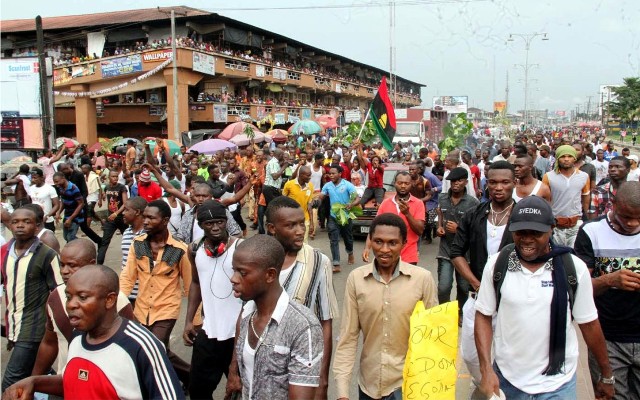Editorial
That IPOB Claim To PH

A recent statement credited to the Indigenous People of Biafra (IPOB) says that the pro-Biafra group has declared Port Harcourt, the Rivers State capital, as its operational base. According to the statement issued by the group’s Media and Publicity Secretary, Mr. Emma Powerful, Port Harcourt was chosen based on the fact that many people now regard it as the unofficial power base of the IPOB-led Biafra resurgence, especially in the South-South geo-political zone. The release also expressed the hope that Uyo, Oron, Ogoja, Yenagoa and Warri will soon become centres for the Biafra struggle.
Indeed, since the arrest and detention of the London-based leader of IPOB, Mr. Nnamdi Kanu, while on an alleged secret trip to Nigeria two years ago, Port Harcourt has witnessed a number of street processions calling for his immediate and unconditional release from the custody of the Directorate of State Security (DSS) in Abuja.
During some of these demonstrations, Rivers indigenes and residents, particularly those in Oyigbo town, were said to have been harassed, intimidated and forced to shut schools and their businesses and join the agitation. Even the latest of these processions which was reportedly planned as a rally to support US President Donald Trump’s inauguration also turned violent.
But more disturbing is the observation that these street agitations have continued to recur in spite of the many condemnations and outright warnings of the state government and its people against such acts. In fact, as the Chief Security Officer of the State, Governor Nyesom Wike had, in a state broadcast aimed at distancing his government from IPOB activities in the state and also reassure Rivers people and residents of their safety, warned thus: “Let no one be in doubt of the resolve of the Rivers State Government and the security agencies to maintain law and order at all cost within the state and preserve the unity of the Federal Republic of Nigeria.
“Majority of these individuals have come from neighbouring states and, in the course of these protests, disrupted social and economic activities, damaged properties, assaulted and inflicted injuries on other citizens going about their lawful endeavours.”
Similarly, some notable groups in the state, including Ogbakor Ikwerre, National Union of Ikwerre Students, the Rivers Elders and Leaders Council (RELEC) and eminent persons from the state have also prevailed on IPOB and other pro-Biafra agitators to discontinue their demonstrations in Port Harcourt. These groups have respectively argued that Rivers people are not and will never be part of the agitation for Biafra; hence, there is no basis for any pro-Biafra group, under whatever name or guise, to adopt Port Harcourt as its operational base.
The Tide endorses the sentiments of the state government and these Rivers groups and persons who had lent their voices against any further use of Port Harcourt for IPOB protests. We, therefore, view the sustained reference to Port Harcourt as ‘Igweocha’ and its declaration as IPOB’s operational base as an assault on the sensibilities of Rivers people.
While we are not opposed to the privileges of any section of the country to self determination and freedom of association, we, however, think that no person or group has the exclusive right to force another to belong to where they do not want to be. It is also our candid position that if there is any entity in the Nigerian project that feels so seriously marginalised, it is obviously the southern minorities to which Rivers State rightly belongs.
IPOB should, therefore, cease to cause disaffection among Rivers people or the Ijaws in their quest for a sovereign state of Biafra. What’s more, it is almost 50 years since the creation of Rivers State and its subsequent liberation from the avoidable rebellion that resulted to the Nigerian Civil War, but not all the war survivors from these parts would want to be reminded of their unsavoury experiences as refugees in neighbouring lands.
Before Nigeria’s Independence in 1960, the minority people of the Niger Delta did have cause to demand for self determination without causing rowdy protests anywhere beyond their shores. This peaceful move gave rise to the establishment of the Willinsk Commission and later, the Niger Delta Board. Again, even in the face of military dictatorships in the 1990s, the Ogonis of Rivers State were led by the late internationally acclaimed environmentalist, Kenule Saro-Wiwa, in non-violent processions to draw global attention to the operational excesses of a multinational oil firm in Ogoniland and, by extension, the oil-rich Niger Delta. These processions were mainly in and around Port Harcourt, but certainly not in Enugu, Umuahia, Owerri or any other part of Nigeria.
We, therefore, implore the state government and Rivers leaders to continue to defend the people’s inalienable right to belong to where they want and speak in one voice against what we consider as a clear and grave danger. The Ijaw National Congress (INC), Ijaw Youth Council (IYC) and other such bodies must join their Ikwerre counterparts to speak out now or never.
Editorial
Sustaining OBALGA’s Ban On Street Trading

Editorial
AFCON ’25: Bravo, Super Eagles, But…

Editorial
Fubara: Celebrating A Leader At 51

-

 Politics2 days ago
Politics2 days agoAPC Releases Adjusted Timetable For Nationwide Congresses, Convention
-

 Business2 days ago
Business2 days agoCustoms Seek Support To Curb Smuggling In Ogun
-
Sports2 days ago
DG NIS Wants NSC Board Constituted, Seeks Increased In Funding
-

 Sports2 days ago
Sports2 days agoSWAN Rivers Set-up Five Functional Committees
-
News2 days ago
Police Bust Kidnapping Syndicate In PH
-
Sports2 days ago
NSC Disburses N200m Training Grants To 26 Athletes
-
Sports2 days ago
‘NTF Will Build On Davis Cup Success For Brighter Future’
-

 Featured2 days ago
Featured2 days agoINEC Proposes N873.78bn For 2027 Elections, N171bn For 2026 Operations

